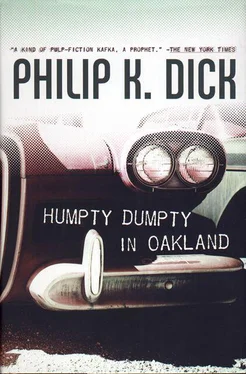“I can’t.”
“You did for one minute, when you walked into that man’s office. Or he not have decided to hire you. You done it once, so you can do it again, and not for a second but all the time. You live like you some French foreign agent in Tangiers; you make up stories to keep yourself interested, and pretty soon they get interested in you. If by popping a couple of those goofballs you can do it, then you don’t need them; you throw away that little tin you carry and you make it alone, on your own. I know you can. And by God, you worth eight hundred a month starting salary; he right to pay you.”
Al was silent, thinking about what Tootie was saying.
“I be frank,” Tootie said. “I give my right arm to be where you are now. Getting an offer like that. But I never will. Partly because nobody hire colored for any big dough except in the entertainment industry, and partly because I am no-talent. That why I have to earn my living as clerk in the County Department of Health, writing up reports on outdoor toilets. I just a clerk. But you basically a big bullshitter; basically, you got a line already. All you need is to get it out.”
“I was taught it was good to tell the truth,” Al said.
“Sure, you get to heaven by being a truth-teller. Is that where you going to go? Is that your destination? Or you determined to live a happy life here? If the latter, you learn to give out with your line, and never stop; never let down. Not till you dead. Then you can tell the truth; you not actually a big butter-and-egg man from Boise, who own six oil wells and be president of local chamber of commerce.”
Al felt thoroughly crushed.
“The truth vastly overrated anyhow,” Tootie said, half to himself. “Actual truth is, everybody stink. Life a drag. Everything that live going to die. Truth is, nothing worth doing; all end badly anyhow. You tell that, you doing nobody a service.”
“That’s not the only side of reality,” Al said.
“Okay, maybe not. Other side is what? You tell me.”
Al considered, but he could not express it. However, he knew that Tootie was wrong. Tootie was embittered. Possibly rightly so. But his outlook had been poisoned years ago by his clerical job in fact and his dreams of glory in fantasy. No wonder he hung around bars with Doctor Mudd, attracting attention as best he could, living it up when he could; he was right to do that, but surely there were other ways, better ways out.
“You’re basically a bitter man,” Al said. “I have a feeling you hate people. You hate me.”
“Hell you say,” Tootie said.
“You’d be pleased if I debased myself by becoming what Chris Harman wants.”
“What does he want?” Tootie said mockingly. “You don’t even know. Evidently you hit on it by accident for a minute. Maybe you could keep hitting on it, maybe not.”
“I’m not going to try,” Al said.
“Oh, I think finally you come around,” Tootie said. “If you can get your wits going and manage to figure it out. It take time, and you do a lot of talking, but you come around. Your fear is because you afraid you can’t hit on it; you afraid you try and fail. What’s so virtuous about that?”
Al could not give an answer to the question. Perhaps Tootie was right; perhaps he simply lacked the courage to try to tailor himself along the lines that Chris Harman sought. The courage and the talent.
“You jerk,” Al said. “You’re eaten up with envy because I got this good job offer. You’re just trying to make me feel bad. You’re getting back at me.”
“Listen, Daddy,” Tootie said. “You better be careful.”
“I’m careful,” Al said. “Careful enough not to bring any more good news to you.”
Tootie said, “So it is good news.” He grinned. “You really tickled pink down inside about this job; you secretly gloating away about it—couldn’t wait to get over here and tell me. Some cracker offers you eight hundred a month—you hardly able to sit still in your pants, thinking about all that bread. You really live good— you buy Old Forrester all the time, pretty soon, instead of that stuff the liquor store have on sale, that Colonel St. Masterson bourbon that taste like it come down a drainpipe from the roof.”
The door from the kitchen opened. Mary Ellen Dolittle put her head in. “Listen, you boys getting a little too much carried away. Better calm down.”
“Okay,” Al said. Tootie nodded woodenly.
“I surprised at you,” she said in her small, delicate voice. “Both of you always quarreling; and tonight both of you sober, an’ still quarreling. It not do you either any good to stay sober, it look like.” She remained, while they stared down at the floor. “I tell you what ail you, Al Miller,” she said. “I listen to everything you say through the door while I clean the stove. What you not got is, you not got faith in God, like you ought to. I know you two sneak out of the kitchen because you know I start talking God-talk to you, but it too bad, because I talk it to you anyhow, whether you like it or not. Not any grown man any good to he fellow man unless he spend time in he church at least once a week meditating on the value of the word come down to earth. You know, Al Miller, the world going to pass away and there be an Armageddon one of these day soon. And the sky roll up like a scroll, an’ the lion lie down with the lamb.”
Tootie said, “Mary Ellen, you a nut. You go clean the stove and leave us alone. You worse than being married to some old grandma.”
“I tell you perfect truth,” Mary Ellen said. “It all written down in the weekly five-cent magazine, The Watchtower, which we Witnesses put out and distribute. Mr. Miller, you not leaving here until you fork over five cents for a Watchtower , which carry the word of God in ninety languages—I think it is—throughout the world.”
Tootie said, “She just come out of the jungle, I think sometimes. Like being married to a savage or something.” His face was contorted with shame and fury.
“I go home,” Mary Ellen said softly, bending down. “One day. Back to my home.”
Al said, “You mean Missouri?” He knew that she had been born there; had been in California only three years.
“No,” she said. “I mean Africa.” The door shut then; she had gone back to cleaning the stove.
“Christ,” Tootie said. “She calls Africa ‘home’ and she’s never been east of Missouri. It’s that religious stuff, that Jehovah’s Witnesses. She never even met anyone from Africa, except at their meetings they have speakers from Africa who lecture.”
They grinned at each other.
“How about a drink?” Tootie said, rising. “Some Colonel St. Masterson, age one year.”
“Okay,” Al said. “With water.”
Tootie went into the kitchen to get glasses.
By the next morning, Saturday morning, Al Miller had decided to take the job.
As he unlocked the chain at Al’s Motor Sales and bent to pick up his mail, he realized that the first person to tell was not Julie, nor even Chris Harman, but the old man.
The doors of the garage had been opened; Jim Fergesson, as usual, was at work for at least the early part of Saturday. He would probably work until noon or one, depending on how much work had to be done.
And now, Al realized, is the time to tell him. As soon as possible, now that I’ve decided. In view of what I said to him about Chris Harman.
Accordingly, he left his lot and entered the garage by the side door. The old man had opened it to get more ventilation and light.
He found the old man in the office. Fergesson sat opening his mail; he glanced up at Al, his eyes red-rimmed, watery. In a hoarse voice, he said, “Long time no see.” His attention returned to the letter which he was reading. So Al sat waiting.
Читать дальше










